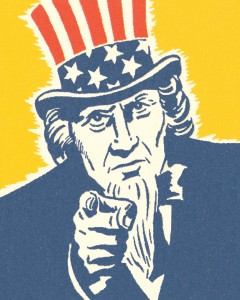 By Nick Geannacopulos and Emily Barker
By Nick Geannacopulos and Emily Barker
With the election upon us, political expression at work likely has intensified and at times may have led to disharmony. We all understand that political speech receives the highest protection in the civil arena—but how far does that protection extend in the California workplace? What if your at-will employee goes on the radio to assert a political stance directly adverse to your company’s interests? Can you stop the company-wide email that asks for contributions to the local independent candidate? Can you require your nostalgic baby boomer to take down his “Nixon’s The One” poster in his office?
A reasonable employer might think that it can regulate, or stop entirely, potentially disruptive workplace conduct that occurs on company premises. But let’s remember once again that California is peculiar: employers here must navigate around strong protections for political activities that apply both in and outside the workplace. Specifically, California Labor Code sections 1101 and 1102 prevent private employers from controlling or attempting to restrict employees from participating in political actions or activities.
Now let’s revisit the examples we mentioned above:
- Your employee who went on the radio is likely protected from any significant discipline: Employees in California fired for their political activity can sue for breach of public policy in violation of Labor Code section 1102.
- Annoying firm-wide emails will also be hard to control, unless the company has an unusually strong and uniform policy prohibiting all solicitations. Under Labor Code section 1102, a California employer cannot threaten or take adverse employment action against an employee to influence the employee’s political activity. An employer responding to email campaigning would want to tread lightly, even if obnoxious emails may otherwise be against your company’s electronic media usage policies.
- Nixon’s last remaining fan is probably safe too! California law makes political affiliation a protected characteristic, and prohibits discrimination against employees and applicants on the basis of an actual or perceived political affiliation. So that job applicant with the “Pro” or “Anti” gay marriage button on her purse is as protected as the baby boomer with the Nixon poster who has been with the company for 30 years. See Nava v. Safeway (employee stated cause of action by alleging he was fired for tearing down a pro-gay marriage sign at work).
Reminder: In addition to the prohibitions discussed above, California law imposes affirmative duties on employers with respect to political elections. Employers must provide employees who lack time to vote during non-working hours up to two hours of paid time to vote. Employers must also post a notice in the workplace at least ten days before any statewide election that its employees are entitled to this paid leave. For examples of compliant workplace posters, see http://www.sos.ca.gov/elections/time-off-to-vote.htm.
And let’s remember, too, that the National Labor Relations Act, as well as other sections of the California Labor Code (such as section 96(k)), can further complicate an employer’s efforts to regulate the political activities of its employees.
Workplace Solutions: The lesson for California employers is to be cautious about taking any action with respect to political activities or affiliations. And make sure your employees have time off to complete their civic duty, if they need it. If you have any questions about California Peculiarities in an election season, please don’t hesitate to contact your favorite Seyfarth counselor.
Edited by Coby Turner